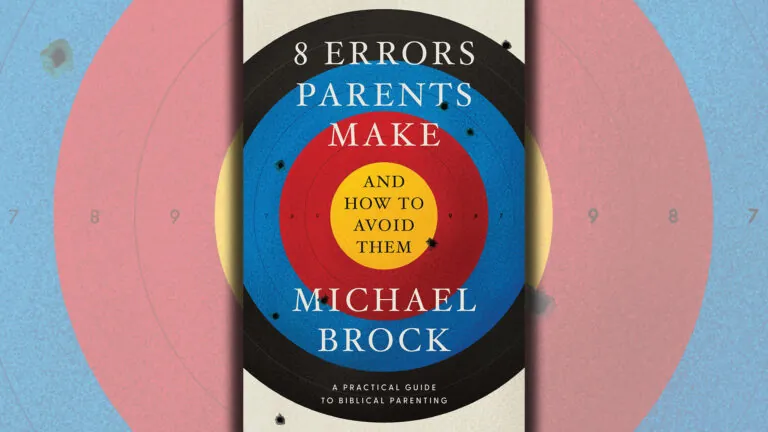by Michael Brock
2024 / 224 pages
Climbing the ladder out of the tranquil waters of Middleton beach, my ears were assaulted by an angry rant. A mother was giving her son a verbal lashing right there on the pontoon deck. The issue, I could not help but learning, was the misuse of some borrowed snorkeling equipment. But the incident was apparently indicative of what a completely useless boy he was in general. “Give me a break, lady. Do you really think your caustic belittling is helping? What chance does this kid have of growing up into a confident, well-adjusted adult? Listen to yourself!” Now I didn’t say any of that aloud. I dove back in and swam to the jetty.
But it got me thinking. What does my parenting sound like? Renae and I were reading the recently published 8 Errors Parents Make and How to Avoid Them by Michael Brock. When a friend recommended it, I had raised my eyebrows at the word “Error” in the title. Couldn’t he have titled it, “8 Principles”? Put it in the positive. Give us a bit of encouragement here. But I’ve read the book (twice). “Errors” is the right word. You could even say “Sins.” The book is concise, but incisive and biblical.
Nothing new
Author Michael Brock opens by admitting that he’s not giving anything new here. In his introduction, he cites some of the materials he and his wife have benefited from. These include a lot of the titles we read earlier in our parenting career: Douglas Wilson, Gary and Anne Marie Ezzo, the Tripp brothers (Paul and Ted). But Brock’s contribution is that he nicely balances the explanation of biblical principles with specific practical application. He’s not afraid to describe what this can look like in practice. He acknowledges that other parents have raised godly kids, doing things differently. He’s not saying that if you don’t raise your child as he counsels, you are guaranteed a rebellious child. But he is saying there are clear biblical principles that must be applied by everyone. We ignore them to our peril.
Parenting begins with parents
For example, the first error is “Shifting the blame.” We like to spread around the blame when things go wrong. One of his mantras is that “parenting begins with parents.” If you are an angry person, your children will likely be angry. If you are a lazy person, your children will likely be lazy. If you are a joyful person, your children will probably be joyful. For sure, there are exceptions. Prodigal sons and daughters break the hearts of their godly parents. But still, parents need to recognize that their training has a massive impact. They have received both authority and a call to train their children.
Now, this might not sound like good news, but it is. Because when we see we are shifting the blame, there is grace and power to change. For example, Brock emphasizes that you need to pray with your kids. Not just prayers at mealtimes but meaningfully bringing your needs and theirs before the throne of grace, through the ups and downs of life. You might say, “I’m not good at that. I’ve never done that.” Well, you must learn. With the help of the Lord and His people, you can.
When the stakes are low
The book has a chapter on each stage of child development: toddler through to teenager. He advises parents to be strict and teach obedience when children are young, so that they can loosen up and give more independence when they are older. Otherwise, older children get frustrated. But many parents do it the other way around. They smile at the foibles and rebellion of their toddler. Tantrums are kind of cute in a one-year-old. But later on, it’s not so cute, and then parents try to rein things in. But sin is sin, even in the young. So, discipline when the stakes are low (“Eat your broccoli”) so that later they will listen when the stakes are higher (“Don’t date that guy”).
What does that discipline look like? Our culture has all but lost an understanding of what a loving spanking looks like. Brock gives clear step-by-step guidance on what discipline looks like as the child matures (here he riffs on Ted Tripp’s book, Shepherding a Child’s Heart). Without proper discipline, parents must resort to controlling their young children by berating them. The tirade I heard on the Middleton beach pontoon was much more painful than a couple of paddy whacks.
Joy and laughter
You may be getting the impression that this book will turn your home into the VonTrapp residence (pre- Maria). But far from it. Brock paints a picture of how beautiful and fun a Christian family is. It is not a dour, unpleasant place. It can be full of more laughter and joy than you can imagine. And children who are disciplined and trained when they are young can grow to be your lifelong friends as adults.
Was there anything I didn’t like? Anything unbiblical? I wondered whether by emphasizing the responsibility of the parent to train, Brock might miss the grace and sovereignty of God. When a child grows up to love and serve the Lord, that is the result of a miracle of God’s grace. We can’t take credit for it. But Brock affirms that too. There are no perfect parents. God uses us through our weaknesses. Parents are responsible to do their best and then trust the results to the Lord.
The solution to regret
Brock describes the day his daughter left for college. His heart was full of regrets. “I should have spent more one-on-one time with her. I have not taught her the best ways to have personal devotions. Etc….” When we are overcome with a feeling of failure, the solution is not to get defensive. It is not to try to remind ourselves of the good things that we’ve done. The solution is to confess our weakness and sin to the Lord. And then to trust that there is grace and forgiveness in Christ. And rest in that grace. God uses us in our weakness. We can trust that by His power we (and they) can grow. While reading the book for the first time, I found myself regularly stopping to repent and pray.
I’d recommend Brock’s book to new and experienced parents. You might wince at times. But that’s good. It’s the clear, biblical, practical instruction that parents need.
Rev. Arend Witten in the pastor of the Free Reformed Church of Baldivis. This is reprinted with permission from the June 2025 issue of “Una Sancta.”












